When it comes to maintaining your vehicle’s health and optimizing its performance, one product I swear by is the STP Complete Fuel System Cleaner. Whether you’re dealing with an older car that’s seen its fair share of miles or a newer model you want to keep in pristine condition, this fuel system cleaner is an absolute must-have.
Why?
It works hard to save gas, remove those pesky deposits from your fuel system, and restore your car’s performance—all while being super easy to use. Honestly, I wouldn’t recommend anything else if you’re looking to get the most out of your vehicle.
Now, let’s get into the details of what makes the STP Complete Fuel System Cleaner a product worth having. From its ease of use to the real results it delivers, you’ll understand why I—and countless other drivers—continue to trust this product for routine vehicle maintenance.
My Experience Using STP Complete Fuel System Cleaner
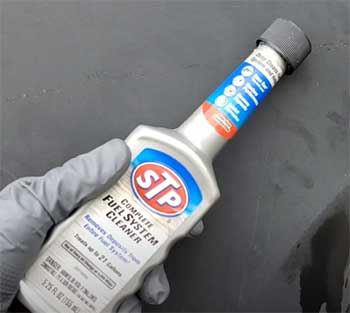
When I first started using STP Complete Fuel System Cleaner, I wasn’t expecting a huge difference.
I figured it would be one of those “nice-to-have” products that maybe helps a little but isn’t particularly life-changing.
Boy, was I wrong!
The first time I used it, I poured the cleaner into my nearly empty gas tank, filled it up with fuel, and went on with my day.
By the time I’d driven through that tank of gas, I could actually feel the difference.
One of the first things I noticed was how much smoother my car was idling. Before using the cleaner, there had been this slight roughness when my car was stopped at lights or in traffic. Nothing too bad, but definitely noticeable.
After using the cleaner, that rough idle all but disappeared. The engine felt quieter and more stable, which immediately made driving feel more comfortable.
The acceleration also improved. Before, it felt like my car was hesitating just a little bit when I pressed the gas, especially when trying to speed up quickly. After using STP, that hesitation was gone.
The car responded almost instantly when I pressed the accelerator, which made merging onto highways and passing other cars a lot smoother.
Even my fuel economy saw a slight improvement. I’m not saying I doubled my mileage or anything, but I did notice that I was able to drive a bit farther on a tank of gas after I started using STP. Over time, that kind of fuel efficiency can really add up.
Now, I use the STP cleaner regularly—every time I get my oil changed. It’s become a key part of my car’s maintenance routine. It’s affordable, easy to use, and I know it’s helping to keep my engine clean and running at its best. I wouldn’t go back to not using it.
Pros of Using STP Complete Fuel System Cleaner
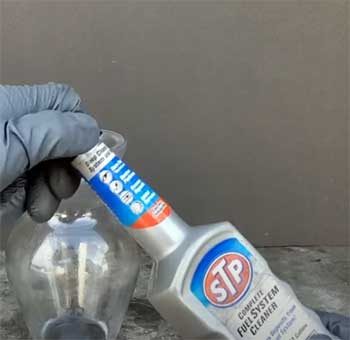
- Ease of Use: This cleaner couldn’t be easier to use. Just pour it in before filling your tank, and you’re good to go. There’s no need for complicated tools or extra steps.
- Improved Performance: You’ll notice a smoother idle, better throttle response, and quicker acceleration. For me, the performance improvements were obvious after just a couple of uses.
- Fuel Efficiency: One of the big reasons I keep using STP is the slight but noticeable improvement in fuel efficiency. Over time, it adds up, making it easier on your wallet at the pump.
- Restores Older Cars: If you’re driving an older model, this cleaner works wonders at removing those deep deposits that can cause performance issues.
- Compatible with Cap-less Fuel Tanks: This is a great feature because I don’t have to worry about spilling or fumbling around with extra equipment.
- Affordable: Compared to other premium fuel system cleaners on the market, STP offers excellent value without compromising quality.
Cons of Using STP Complete Fuel System Cleaner
- Won’t Fix Major Issues: If your car has serious engine problems, don’t expect this cleaner to perform miracles. It’s great for maintenance, but it won’t repair mechanical issues.
- Minor Improvement in Gas Mileage: While I did notice a slight improvement in fuel economy, don’t expect dramatic changes. It helps, but it’s not going to double your miles per gallon.
- Needs Regular Use: To maintain optimal performance, you have to use it regularly. For some, this might feel like a hassle, but for me, it’s a small price to pay for better vehicle performance.
How To Use STP Complete Fuel System Cleaner?
Using this product is super simple, and that’s one of the things I love about it. All you have to do is:
- Make sure your fuel tank is nearly empty.
- Pour the entire bottle of STP Complete Fuel System Cleaner into your tank.
- Fill your tank with gasoline, and you’re all set.
That’s it! The cleaner will start working as you drive, cleaning out deposits from the fuel injectors, intake valves, and combustion chambers. I recommend using it every 3,000 miles or so, depending on your car and driving habits.
Tips For STP Complete Fuel System Cleaner
- Use Regularly: Incorporating this cleaner into your vehicle’s regular maintenance routine will help keep your engine clean and running efficiently. I use it at every oil change.
- For Older Cars: If your car is older, use the cleaner twice a month to really help clean out those deep, stubborn deposits that can build up over time.
- Keep the Tank Full: It’s a good idea to keep your gas tank as full as possible after using the cleaner to help it circulate through your entire fuel system.
How To Compare With STP Complete Fuel System Cleaner?
When it comes to choosing the right fuel system cleaner, it’s easy to get overwhelmed by the number of options available. I’ve tried several over the years, and while some worked okay, none gave me the same consistent results as STP Complete Fuel System Cleaner.
Let’s take a look at how it stacks up against other popular brands like Lucas Fuel Injector Cleaner, Techron Fuel Injector Cleaner, and Gumout Fuel Injector Cleaner.
- STP Complete Fuel System Cleaner Vs. Lucas Fuel Injector Cleaner
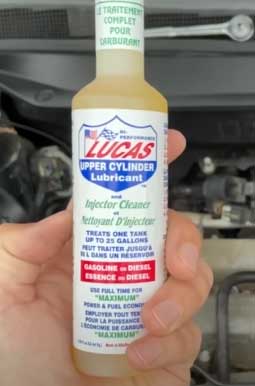
Lucas is a well-known name in automotive products, and their Fuel Injector Cleaner is no exception.
Lucas fuel injector cleaner focuses heavily on lubrication, which is great if you’re looking for something to reduce wear and tear on engine components.
However, I didn’t feel like it had the same cleaning power as STP when it came to tackling carbon deposits and improving overall performance.
While Lucas is solid for protecting the fuel system, I noticed more immediate results—smoother idling and better acceleration—when I used STP.
Lucas may be a better fit if you’re more concerned with lubrication, but for actual cleaning and performance improvement, I’d choose STP.
- STP Complete Fuel System Cleaner Vs. Techron Fuel Injector Cleaner
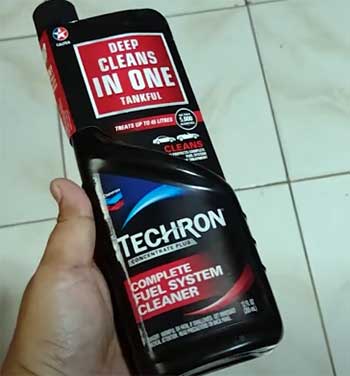
Techron is another big player in the fuel system cleaner market, and for good reason.
It’s often recommended by car manufacturers for its ability to clean fuel injectors and prevent carbon buildup.
In my experience, Techron fuel injector cleaner is excellent for maintaining a clean system over the long haul, especially if you’ve been using it consistently.
However, where STP edges out Techron is in the immediate, noticeable performance improvements.
With STP, I felt a difference in my car’s throttle response and smoothness after just one use.
Techron is great for preventing future issues, but if you’re already experiencing rough idling or sluggish acceleration, STP delivers faster results.
- STP Complete Fuel System Cleaner Vs. Gumout Fuel Injector Cleaner
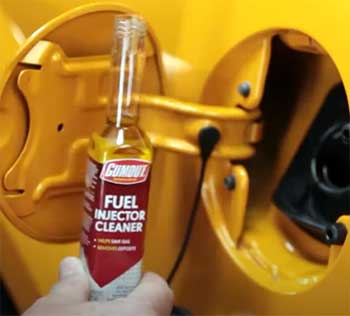
Gumout is another highly regarded brand, and it does a decent job at cleaning fuel injectors and preventing deposits from forming.
However, Gumout’s formulation is a bit more basic compared to STP’s advanced jet fuel carrier system, which helps in breaking down deposits more thoroughly.
While Gumout fuel injector cleaner is effective, I found STP to offer a more comprehensive clean, especially in older cars.
Additionally, STP felt like a more versatile product because it targets the entire fuel system, whereas Gumout seems to focus more narrowly on injectors.
Frequently Asked Questions (FAQ)
Yes, STP Complete Fuel System Cleaner is perfectly safe to use with all gasoline engines, including those with turbocharged engines and vehicles that have cap-less fuel tanks. It’s formulated to clean without causing any damage or corrosion to the engine’s components, so you can feel confident using it.
You should notice improvements within one full tank of gas after using STP Complete Fuel System Cleaner. However, for optimal results, use it regularly—about every 3,000 miles or at each oil change.
There are generally no negative side effects from using STP Complete Fuel System Cleaner, especially if you follow the recommended guidelines. However, if your engine has a lot of built-up deposits, you might notice a slight change in how the car drives immediately after the first use, but that should smooth out quickly.
Using it is simple! Just pour the bottle into your fuel tank before you fill it with gas. It’s compatible with cap-less tanks, so you don’t have to worry about making a mess. After that, drive as usual, and the cleaner will work its magic.
Final Verdict: Why You Should Buy STP Complete Fuel System Cleaner?
All in all, the STP Complete Fuel System Cleaner is a must-have for any vehicle owner looking to keep their car running smoothly. From better acceleration to improved fuel efficiency, it’s a product that works hard to deliver real, noticeable results.
It’s easy to use, affordable, and most importantly, effective. If you care about your vehicle’s performance and want to avoid costly repairs down the line, do yourself a favor and add this cleaner to your maintenance routine. .
You won’t regret it!

